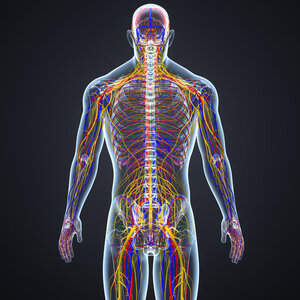Hormone Therapy for Cancer
Many cancer patients get hormone therapy, which is an umbrella name for a number of medical technologies. Hormone therapy is often used as an adjuvant to the main treatment of chemotherapy or surgery. Also called endocrine therapy, it is most often used in hormone-dependent tumors and often when the cancer is in an advanced stage or metastatic.
Some tumors’ growth is fueled by hormones. Physiologists like to say hormones “modulate tumor developmental progression.” Block the hormone action or reduce the amount of hormone in the body, and you effectively fight the cancer. Therapies in this class include chemicals (1) that stop the body’s ability to produce hormones and (2) that block hormone receptors at a cellular level and hence modify how hormones affect the body.
Cancers that are promoted by steroid hormones have specific receptors on the malignant cells for those hormones. These include prostate cancer (receptors for androgens), breast cancer (receptors for estrogens), and lymphomas (receptors for prednisone).
It’s not hormone replacement therapy
You may have heard of hormone replacement therapy. That is in many ways the opposite of hormone therapy against cancer. Hormone replacement therapy is about increasing the amount of hormone. Hormone treatment to fight cancer works by:
- Blocking the receptors on the malignant cells that hormone molecules would normally bind to or somehow otherwise interfering with the receptors at a biochemical level.
- Stopping the body’s production of the hormone.
Hormone therapy is widely used in treatment of prostate and breast cancer and less so in some other cancers. Common side effects are those seen when levels of the targeted hormones decline.
Another great thing about hormone therapy is that sometimes you can test tumor cells outside the body to see if the therapy has potential. Biopsy of cancer cells can identify how many steroid receptors they have and whether hormone therapy will work.
Androgen deprivation therapy — or ADT
Reducing androgen levels can be useful for treating prostate cancer. Prostate cancer cells have receptors that testosterone molecules bind to, and stopping this binding can slow the tumor growth.
Luteinizing Hormone Releasing Hormone Agonists slow the release of that hormone by the pituitary and therefore the production of testosterone in the body. Drugs in this class include Goserelin (sold under brand name Zoladex) and Leuprolide (Lupron). Gonadotropin-releasing hormone antagonists (GnRH blockers) lock onto cell receptors in the pituitary gland for this hormone and effectively reduce the release rate of the hormone. This action likewise reduces production of testosterone. Firmagon (Eulexin) is a drug that works this way.
Triptorelin pamoate (Trelstar) and Abarelix (Plenaxis) are gonadotropin releasing hormone (GnRH) agonists employed in treatment of prostate cancer. Cetrorelix is a GnRH blocker used to fight breast and prostate cancers.
These drugs are part of androgen deprivation therapy (ADT), which is a subset of hormone therapy.
Another tactic is giving the patient drugs that bind directly to the testosterone receptors. So-called anti-androgen medicines include bicalutamide (Casodex), cyproterone acetate (Cyprostat) and flutamide (Drogenil).
Breast cancer
Estrogen and progesterone influence the growth of some (but not all) breast cancers. Scientists describe estrogen receptor positive (ER+) tumors and progesterone receptor positive (PR+) tumors (cancers can be both ER+ and PR+). If an oncologist determines a patient has this form of cancer, hormone treatment for breast cancer works by stopping these hormones from getting to the breast cancer cells.

Systemic Treatment of Cancer
Tamoxifen is widely used to fight breast cancer that is ER+. It blocks estrogen molecules from receptors on tumor cells and thereby reduces the chances that breast cancers will grow. (Tamoxifen slightly increases the risk of uterine cancer.)
Hormone therapy is used widely in breast cancer treatment, but doctors choose therapy types partly based on whether the patient has undergone menopause or not.
Hormones that are part of the sex hormone cycle stimulate or inhibit cell proliferation. Estrogens promote growth of breast cancer and endometrial cancer (a form of uterine cancer) and may (it is not sure) promote ovarian and colon cancers. Women who have been through estrogen replacement therapy after menopause are slightly more likely to get breast cancer. And these cancers are more likely to be ER+ and are less aggressive than breast cancers that affect women who never had hormone replacement therapy.
Aromatase Inhibitors
Aromatase is an enzyme that converts androgens, such as testosterone, to estrogens. Inhibitors – drug names include anastrozole, exemestane, and letrozole – stop the enzyme by binding to it. When aromatase doesn’t work, levels of estrogen decline in the body. More on this.
Adrenal steroid inhibitors
The adrenal glands make corticosteroids, which are precursors for estrogen, androgens, and other hormones. But slowing adrenal gland action, these inhibitors can effectively slow growth of some hormone-fueled tumors.
Mitotane (brand name Lysodren) is an ASI and is used in treatment of cancer of the adrenal glands themselves. Aminoglutethimide (Cytadren) occasionally finds use in breast cancer treatment.
Androgens such as fluoxymesterone, testosterone, and testolactone are (rarely) used to counteract estrogen and similar compounds in treatment of estrogen-dependant tumors.
Breast cancer patients often get hormone therapy after the initial therapy (which is often chemotherapy); this happens in both patients with estrogen receptor (ER)– and/or progresterone receptor (PR)–positive metastatic breast cancer.
PDF List of Hormone System Meds for Cancer Treatment.
Other webpages about endocrine therapy:
https://www.cancer.gov/about-cancer/treatment/types/hormone-therapy
https://www.cancerresearchuk.org/about-cancer/womb-cancer/advanced-cancer/treatment/hormone-therapy
https://www.uclahealth.org/urology/prostate-cancer/hormone-therapy
https://www.cancer.org/cancer/prostate-cancer/treating/hormone-therapy.html